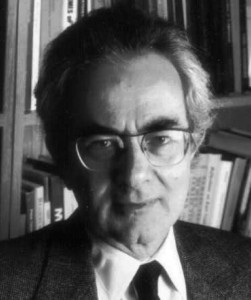As Upton Sinclair famously said, “It is difficult to get a man to understand something, when his salary depends on his not understanding it.” Perhaps that’s why, when academic philosophers talk about consciousness, they fall prey to the very idolization of the intellect that is the basis of their livelihoods.
 How can philosophy offer anything more than a logical analysis of consciousness when philosophers continue to make consciousness synonymous with mental processes?
How can philosophy offer anything more than a logical analysis of consciousness when philosophers continue to make consciousness synonymous with mental processes?
When such luminaries as Thomas Nagel say things like, “mind, I suspect, is not an inexplicable accident or a divine and anomalous gift but a basic aspect of nature that we will not understand until we transcend the built-in limits of contemporary scientific orthodoxy,” it sounds very insightful, but it only begs the question.
What does he mean by ‘mind?’ Does he mean man’s vaunted cognitive abilities? Of course he does, and Nagel, for one, gives himself away by saying that he’s talking about “the study everything mental – consciousness, meaning, intention or purpose.”
But is consciousness limited to and defined by the mental dimension? Why do professional philosophers continue to place consciousness, as Nagel does, within the context of ‘everything mental?’
That is a fatal flaw, not only for philosophy, but also for understanding and awakening consciousness greater than the sum of all our mental processes. It’s an example of how, when all the idols of thought have been stripped away, thought makes an idol of itself.
Not that the study of how mind-as-thought, including our precious subjective selves, evolved in and from “the immanent order of nature” isn’t interesting, and properly a subject of scientific research. But any attempt to privilege the subjective experience of the unexamined self/ego ends up doing the same thing Nagel rightly criticizes science for: “Subtracting from the physical world as an object of study [something] mental.”
Unless, that is, Nagel is willing to say that the observer is somehow separate from that which it observes, which is precisely the sort of dualism that brought philosophy to the cul-de-sac it finds itself.
Making cognitive abilities an object of scientific study is fine, as long as we realize that science is necessarily dualistic and reductive, and that the object of study cannot be the same thing doing the studying, without producing an infinite regress.
Furthermore, making the mind-as-thought an expression of “the immanent order of nature,” without having an unswerving insight into the separative nature and fragmenting tendency of thought, does a disservice to nature, humanity and consciousness.
In short, “the immanent order of nature” is a given. Also, “the mental,” or ‘higher thought’ arose from that  order. However, thought is generating increasing fragmentation and disorder, imperiling the ecological integrity of the earth. So the real question is: How did the disorder of thought arise from the order of nature?
order. However, thought is generating increasing fragmentation and disorder, imperiling the ecological integrity of the earth. So the real question is: How did the disorder of thought arise from the order of nature?
In a word, “the mental aspects of reality” aren’t the highest aspects of reality. Indeed, they’re not even reality, since they turn on a false premise—separation. Implicitly taking thought as the highest expression of the immanent order of nature has led to speciesism, which is akin to the arrogance of racial superiority, an attitude to which most Western scientists once subscribed.
Speciesism willfully neglects the increasingly pressing question and painful contradiction of how a sentient species that arose from the same background and along the same evolutionary principles as all other life could be bringing about the extinction of so many other animals, and threatening the viability of the earth itself.
Implicit in Nagel’s view is the old idea that the human brain is the apex of evolution. But given what man is doing to the earth, it’s more accurate to say that we are the nadir, a monumental evolutionary mistake. But that view too only begs the question—how could that come to be?
The salient point is that a sentient species that is bringing about only the sixth mass extinction in the history of life on this planet has no business holding up its mind as reflecting “the immanent order of nature.”
At this point, Nagel’s logical conundrum becomes clear–consciousness that can be studied is consciousness that can be reduced to physical properties; consciousness that cannot be studied (because there’s no way to objectify and step out of it) is consciousness that transcends the separative abilities of the mind, upon which science turns.
Philosophy, as Wittgenstein pointed out, should not speak and must not speak about that which cannot be spoken, that which is beyond words. But philosophy can and must point to what is beyond words, images and concepts—consciousness that is simply, silently, aware.
I feel the resolution of the ‘riddle of man’ lies in seeing that the quieting and ending of thought-based consciousness is the beginning of a deeper consciousness that cannot be reduced and studied. That doesn’t  imply a supernaturalism; on the contrary, it implies that when the vaunted mental processes of the brain fall silent, the brain is aware of and shares in a higher order of consciousness that is present every moment.
imply a supernaturalism; on the contrary, it implies that when the vaunted mental processes of the brain fall silent, the brain is aware of and shares in a higher order of consciousness that is present every moment.
The evolution of the human brain (meaning, conscious symbolic thought) makes awareness of cosmic consciousness possible for us as individuals, but cosmic consciousness does not arise from or depend on the human brain.
In other words, creative consciousness does not require us, but is, contrary to Nagel, a gift, a potentiality that the universe has, willy nilly, conferred on Homo sapiens on this planet, and undoubtedly other potentially intelligent species on other worlds.
This view not only lends itself to humility, but to urgency. Because consciousness as we know it is the source of our intra-species division and conflict, as well as the increasing fragmentation of the earth. Non-coincidentally, it is also an impediment to a truly (rather than egoistically) subjective, non-dualistic consciousness.
Nagel rightly says, “The physical science describe, with the aid of mathematics, the elements of which the material universe is composed, and the laws governing their behavior in space and time.”
He also rightly says, “the physical sciences, in spite of their extraordinary success in their own domain, necessarily leave an important aspect of nature unexplained…the subjective essence of the experience – how it is from the point of view of its subject…the mental.”
But then Nagel says that the “most likely solution” is a scientific understanding of nature not limited to a physical theory of the objective spatio-temporal order.” Pardon me, but that’s philosophical gobbledygook. It fails to understand the basic nature of science, and furthermore offers no possible solution to the crisis of consciousness.
There cannot be science without a subject-object orientation; any proposal that presumes to include the mind (even the mind-as-thought) by encompassing and effacing that necessary duality (for science) ends up just producing an infinite regression. What is doing the studying of the subject that is now the object?
There can be a philosophy that transcends the essential subject-object duality of science, but it cannot offer “an expanded form of understanding” for science. Rather, it illuminates the vertical (but not horizontal) limitation of science.
And philosophy itself stops at that door, pointing to infinite dimensions beyond. Call that God if you like, if you need to call it anything at all.
Martin LeFevre

